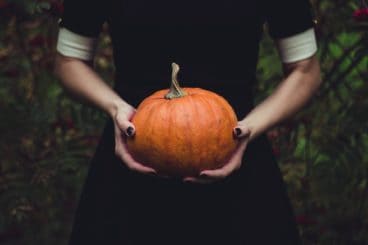
Many of my American friends who take a walk through their neighborhoods today will be greeted by an assortment of scary decorations in front of their neighbors’ homes: carved pumpkins, skeletons, witches, ghosts, gravestones, giant spiders, black cats. Even skulls placed on sticks. In American culture, decorating homes like this is a fun way to celebrate a holiday that is mostly focused on children dressing in costumes and getting free candy.
I sometimes wonder how a new immigrant to America might respond when seeing this. Imagine fleeing a war-ravaged nation, where gravestones and skeletons are reminders of horrors left behind. Suddenly, these same images are showing up in the neighbor’s front yard.
I also wonder why Americans enjoy these macabre decorations. Is it because these are things we no longer fear? Perhaps generations past were haunted by such realities, but now we feel safe in our modernity?
If so, maybe these decorations serve a positive purpose—to declare our victory over the fears of our past. We can use Halloween to remember that we’ve been brought “from darkness into light,” as the Bible says. But I’d like to encourage us on this holiday to also remember those who are still traumatized by recent horrors and offer a prayer for them.
For our family, the image of a skull on a stick reminds us of the horrific genocide that occurred the year our daughter was born, when we were living in Indonesia.
For our family, the image of a skull on a stick reminds us of the horrific genocide that occurred the year our daughter was born, when we were living in Indonesia. A conflict between the indigenous Dayak people of the interior of our island and the immigrant Madurese people turned into a vicious ethnic cleansing of the central province, sending tens of thousands of Madurese into our port city and then fleeing our island altogether. Roughly 100,000 people ran for their lives with what they could carry on their backs. We helped feed some of them at the harbor, as they waited for boats to take them off-island. We heard stories of people who were offering their children for sale for the price of a meal because they couldn’t stand to see their children starve.
But perhaps the worst memory for many people in our area was that the main road between our city and the central province was lined with spears, each spear holding a severed human head. This occurred not even ten miles from our home.
Thank God that today, the Madurese are slowly trickling back into the central part of our island, and are at peace with the Dayaks. God’s healing power is stronger than humanity’s evil.
But let’s remember the suffering people of the world today—in Syria, Democratic Republic of Congo, the Rohingya of Myanmar—there are many for whom skeletons may represent their own lost loved ones.
As you bless the costumed children of your neighborhood with candy, please also pray a prayer of blessing for a hurting world still trapped in the darkness, and for those who long for a day when the horrors of the past are far behind them and they can experience true peace. Make this a Halloween to remember them.
With over 20 years of experience living in the Muslim world, author and speaker Jim Baton has helped tens of thousands of Muslims and Christians learn to overcome prejudice and violence by pursuing peace.


